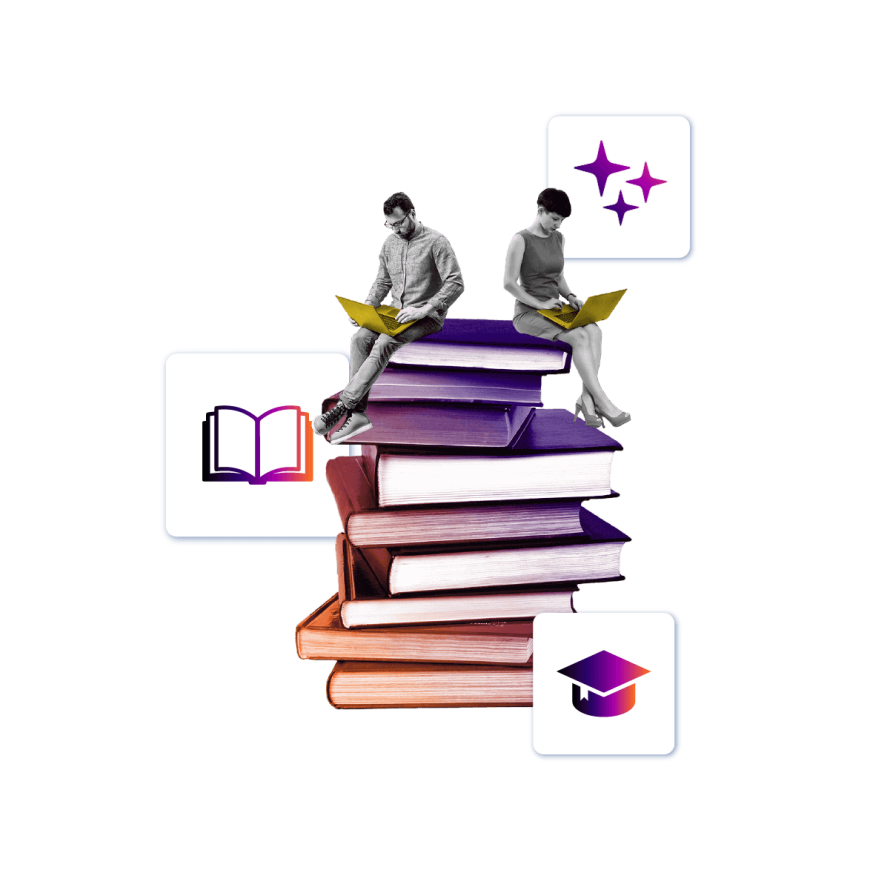Unlocking AI's Potential in Universities
Artificial Intelligence (AI) is empowering higher education, ushering in a new era of personalized learning and efficient academic administrative processes.
Image

All around the globe, AI algorithms carefully analyze how students learn, leading to customized educational experiences that match each person's unique pace and preferences.
Even outside the classroom, systems like AI chatbots help students 24/7, answering questions about courses or school tasks quickly. AI helps predict students' academic performance, identifying those at risk of struggling or dropping out, enabling early teacher intervention to support and help students succeed.
Before we dive in, let’s clarify one point. AI is often an overarching term encompassing everything from smart assistants to ChatGPT. However, many technologies that people assume are AI are actually its specific subset: machine learning (ML).
Machine learning (ML) enables computers to learn and improve independently by analyzing numerous examples rather than receiving direct instructions. For example, ML teaches a computer to predict student success by analyzing thousands of student records rather than using a fixed set of rules to determine who might need extra support.
Now, let’s explore in more detail just how AI (and ML) can transform higher education.
Current and Future AI Technologies Enhancing Higher Education
As universities worldwide embrace technological advancements, AI emerges as an excellent tool for enhancing educational outcomes and operational efficiency.
Streamlining Administrative Tasks for Professors
One of the most impactful uses of AI is in grading automation, where AI systems efficiently evaluate objective assessments like multiple-choice, fill-in-the-blank and short-answer questions. This automation speeds up grading processes and ensures consistency and accuracy in assessment.
IU International University of Applied Sciences developed an AI grading system called Automatic Short Answer Grading (ASAG) that automatically grades answers to open-ended questions consisting of a few sentences. In a study, ASAG's grading was, on average, closer to the official reference grade than the grading by human subject experts, suggesting AI-assisted grading can reduce human subjectivity and improve fairness.
AI-powered feedback mechanisms further enhance efficiency by providing detailed insights into student assignments. Advanced algorithms analyze writing for grammar, structure and content, offering personalized feedback at scale. This capability supports student learning and allows professors to focus more on guiding academic progress.
AI (including ML) also streamlines scheduling and calendar management. Intelligent tools optimize professors' schedules by automatically arranging office hours, meetings and other engagements based on their preferences and availability. This proactive management ensures smoother operations and maximizes productive teaching and research time.
A report commissioned by Google predicted that AI could save teachers and doctors 700,000 hours a year in administrative tasks in the UK alone. As AI continues to evolve, its role in administrative support promises greater efficiency and effectiveness across higher education institutions.
Helping to Aid With Unbiased Admissions
AI algorithms can evaluate applicants, analyzing factors such as academic performance, extracurricular activities and personal backgrounds. By considering a broad spectrum of data points, AI enables admissions committees to make more informed decisions, identifying talented candidates who traditional methods may have overlooked.
AI has the potential to mitigate human biases, offering a more objective and fair admissions process. While AI relies on data and algorithms to assess applicants, it's important to note that it can still carry biases from its learning, potentially producing discriminatory outcomes.
With continued advancements and ethical oversight, AI could promote a more equitable evaluation process in the future. This could lead to universities cultivating a diverse student body that reflects a broader range of backgrounds and perspectives, enriching the educational experience for all students.
However, this is reliant on AI being trained in an unbiased manner. If the training data or algorithms are biased, AI will also promote those biases, undermining its potential to create a fairer admissions process. Ensuring that the data used to train AI systems is thoroughly vetted and represents a diverse and fair sample is crucial. Regular audits and updates of the AI models are a must to maintain their integrity and fairness over time. Moreover, educators need to carefully address data privacy and security concerns when using AI in educational settings to maintain the trust and confidence of students and faculty.
Personalized Learning
Adaptive learning platforms analyze extensive student performance data to adjust the content and pace of instruction dynamically. This personalized approach ensures that each student receives instruction aligned with their unique learning style and abilities, creating more effective and efficient learning outcomes.
In addition to adapting content delivery, AI-powered systems recommend supplementary educational resources and activities based on students' interests, goals and past performance. Like personalized recommendations on streaming platforms, these AI-driven content recommendation systems keep students engaged and motivated throughout their learning.
Intelligent tutoring systems powered by AI provide targeted support by offering personalized assistance and feedback. These systems simulate one-on-one tutoring experiences, helping students comprehend challenging concepts and reinforcing learning objectives. AI tutoring systems supplement traditional classroom instruction, allowing students to succeed academically while promoting self-directed learning.
CogBooks is an adaptive learning platform that analyzes student performance data to adjust the content and pace of instruction dynamically. Arizona State University worked with CogBooks to reimagine the approach to teaching biology. Rather than forcing every student to learn everything in a set manner, students could progress to more challenging material when they were ready or go back and get more support on previous courses. Thanks to this approach, the university has already seen lower dropout rates and higher grades.
Aiding With Research
Platforms like Google Cloud, which integrate AI and ML capabilities, greatly support researchers across various disciplines.
AI-assisted literature review and data analysis streamline the process of analyzing academic literature. Elicit, Research Rabbit and Consensus can rapidly scan and extract critical insights from large datasets, facilitating quicker and more comprehensive literature reviews. This efficiency saves researchers valuable time and allows them to focus on deeper analysis and interpretation.
AI-powered search engines tailored for academic databases enhance researchers' ability to find relevant information swiftly. These intelligent systems understand the nuances of research queries, delivering precise results that match the researchers' needs to reduce the time spent searching and increase information retrieval accuracy.
Chatbot Learning Assistants
With their versatile capabilities, AI-powered chatbots offer many student support and learning experiences in higher education.
Firstly, AI chatbots provide invaluable 24/7 student support, addressing common inquiries related to course content, assignments and administrative matters. This instant assistance alleviates the workload on faculty and staff and ensures that students receive prompt responses to their queries, enhancing overall efficiency and satisfaction.
The University of Iowa’s College of Engineering introduced the AI chatbot DINA, which can answer current and prospective students' questions about the department, courses they are taking, etc. Both staff and students have found the tool to be extremely useful.
Chatbots also offer guided learning experiences through conversational AI. By engaging students in interactive dialogues, chatbots can simulate personalized tutoring sessions. They ask probing questions, provide feedback based on students' responses and adapt the learning pace and content to individual needs. This approach complements traditional instruction, active learning and student engagement.
Identifying Plagiarism
AI technologies (like ChatGPT) have enticed many students to use AI to generate their coursework, creating a pressing problem for universities and colleges as the traditional methods of detecting plagiarism needed revision.
Thanks to AI-powered plagiarism detection tools, academic institutions have a solution and can uphold academic integrity. These sophisticated algorithms compare submitted assignments against extensive academic and online content databases to detect direct copying and subtle forms of plagiarism, such as paraphrasing or patchwriting. They facilitate real-time checks against diverse sources, ensuring student work is scrutinized against the most current and relevant materials.
Examples of this type of AI include Turnitin, Copyleaks and Compilatio.
Helping Student Retention by Predicting Which Students are in Danger of Falling Behind
Image

AI-powered predictive analytics offer higher education institutions tools to enhance student retention rates by identifying students at risk of falling behind or dropping out. These analytics can effectively pinpoint students struggling academically or socially by analyzing comprehensive data sets, including student performance, engagement metrics and behavioral patterns.
Early identification of at-risk students enables institutions to intervene promptly with personalized support strategies. AI algorithms can assist in developing tailored intervention plans that address each student's specific needs, such as tutoring, counseling, financial aid or other supportive services. This targeted approach increases the likelihood of student success and creates a supportive learning environment that encourages academic achievement and personal growth.
Ethical Questions Around Embracing AI
Incorporating AI into higher education systems raises ethical concerns requiring thorough analysis.
Data Privacy
Data privacy is essential as AI systems collect, use and protect student data. In educational settings, maintaining confidentiality is crucial to protecting sensitive information from unauthorized access or misuse. A good hosting provider, such as Pantheon, should help with this by providing stringent security measures and safeguarding data integrity across its services.
Bias in AI Algorithms
We mentioned it earlier, but it's important to remember the potential for bias in AI algorithms to perpetuate unfair or discriminatory outcomes. Transparency and fairness should be key principles in AI development to reduce biases that affect educational opportunities. Studies have shown cases of AI bias influencing decisions, emphasizing the need to be vigilant in designing algorithms to promote equity in academic settings.
Impact on Employment
AI's role in automating routine tasks can enhance operational efficiency within academia. However, concerns over its broader impact on employment remain pertinent. While AI streamlines workflows, its implementation may necessitate significant setup and maintenance efforts. The human element in education, characterized by empathy and nuanced understanding, remains irreplaceable. It's essential to consider how AI complements rather than replaces human educators, ensuring that advancements contribute positively without displacing critical roles.
Ethical Guidelines and Regulations
Existing guidelines and regulations are essential in governing AI use in education, protecting against potential pitfalls such as misinformation from AI-powered chatbots or misuse of AI tools in academic assessments. Adherence to stringent ethical standards is critical for fostering a trustworthy educational environment where students receive accurate information and equitable learning opportunities. Implementing AI solutions must align with these guidelines to uphold educational integrity and ensure students' academic achievements reflect genuine effort and understanding. The EU AI Act categorizes AI applications by risk levels and sets legal requirements. It is a notable example of such regulation.
While ethical dilemmas accompany the integration of AI into higher education, proactive adherence to ethical guidelines and leveraging reliable platforms like Pantheon can mitigate these challenges effectively.
Integrate AI Into Your Higher Ed Institution
By integrating AI into higher education, schools can transform teaching, research and administrative tasks. AI offers unique opportunities for academic progress, such as personalized learning, improved student assistance and more efficient operations.
Institutions need a reliable website platform like Pantheon to harness these benefits effectively. Pantheon's WebOps platform enables universities to manage and deliver their WordPress and Drupal websites efficiently at scale. Pantheon strongly emphasizes security, essential for protecting sensitive student and research data.
Watch our free webinar today to learn how to secure your institution’s website best.